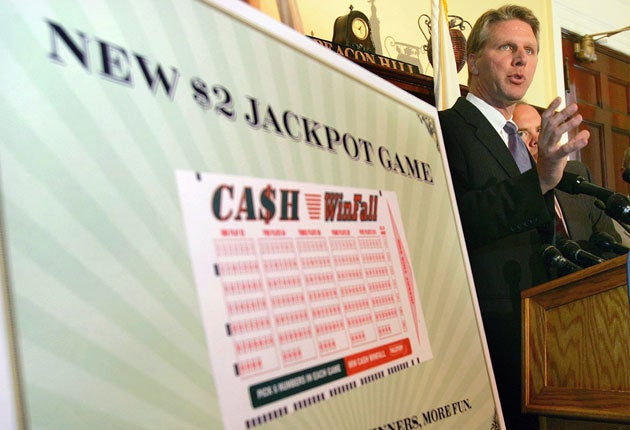Your support helps us to tell the story
From reproductive rights to climate change to Big Tech, The Independent is on the ground when the story is developing. Whether it's investigating the financials of Elon Musk's pro-Trump PAC or producing our latest documentary, 'The A Word', which shines a light on the American women fighting for reproductive rights, we know how important it is to parse out the facts from the messaging.
At such a critical moment in US history, we need reporters on the ground. Your donation allows us to keep sending journalists to speak to both sides of the story.
The Independent is trusted by Americans across the entire political spectrum. And unlike many other quality news outlets, we choose not to lock Americans out of our reporting and analysis with paywalls. We believe quality journalism should be available to everyone, paid for by those who can afford it.
Your support makes all the difference.According to the adverts "it could be you".
But if you happen to live within driving distance of Massachusetts, boast a decent understanding of school mathematics and can get your hands on a few hundred thousand dollars in fairly short order, there are times when it almost certainly will be you.
A select group of semi-professional gamblers has exploited a little-known quirk in one of the state's lotteries to make guaranteed profits from the supposed game of chance. By purchasing vast quantities of tickets, they have, on select days, been able to win more than two-thirds of all its individual prizes.
This example of effectively buying your own luck owes its existence to a game called Cash WinFall, whose rules dictate that, on days when the jackpot rises above $2m (£1.2m) without being won, the value of lesser prizes increases, often dramatically. On these so-called "rolldown" occasions, syndicates of gamblers who have investigated the prize allocation system have toured the state, buying hundreds of thousands of $2 tickets. As a result, they are able to monopolise the inflated prize pool.
No one knows exactly how many millions of dollars they have won in this fashion, but during one typical "rolldown" day in May, state records revealed that 1,105 of the 1,605 prizes worth about $600 each were collected by only three individual organisations. "Cash WinFall isn't being played as a game of chance," said Mohan Srivastava, an MIT-educated statistician famed for exposing a similar flaw in a Canadian scratchcard game. "Some smart people have figured out how to get rich while everyone else funds their winnings."
To be virtually sure of making money from the "rolldown" system, you have to invest large enough sums to minimise the possibility of missing out on prizes due to a possible round of bad luck. A mathematics professor quoted by The Boston Globe calculated that someone who invested $100,000 had a 72 per cent chance of ending up in profit. That figure rose to 99 per cent if they spent more than $500,000.
The only time the system doesn't necessarily work is when someone wins the main jackpot, preventing smaller prizes from being inflated. But since the odds of a single ticket winning are one in 1.96 million, only one person has ever won the top prize on a "rolldown" day since Cash WinFall was created in 2004. Funnily enough, he turned out to belong to one of the three syndicates.
"We have made a profit," admitted Gerald Selbee, a 73-year-old cornershop owner who runs one of the gambling organisations with his wife Marjorie, in an interview with ABC News last week. "It's been fine [though] it hasn't changed our lifestyle any. The maths involved is sixth grade [11- to 12-year-olds]. It's not a great science. We always had an 11 per cent chance of losing substantially, between 60 and 80 per cent of what we spent."
Mr Selbee said he set up the syndicate with 32 friends and acquaintances who pooled their money, and generally made profits of between 1 and 2 per cent per day. But he refused to say how much the group had won in all, or how much it invested. Neither would he explain exactly how he went about buying hundreds of thousands of lottery tickets in a single day.
That has sparked controversy, since anecdotal evidence suggests that at least some lottery retailers, who take a small commission from tickets, have been skirting rules about how they sell them. In some cases shops have allowed purchasers to operate the lottery machines themselves.
News that the public lottery is being exploited by a clever few has caused outrage in Massachusetts, where it has led to a perception of unfairness. The state therefore decided last week to ban individual retailers from selling more than $5,000-worth of tickets to a single buyer and said it will end the Cash WinFall game next year.
Two of the stores that catered to the Selbees had their licences suspended amid allegations of unlawful ticket selling. "The integrity of the lottery is our priority," said Beth Bresneham, the marketing director for the Massachusetts Lottery. "It's critical to our success. We want people to know that when they play, they have the same chance of winning."

Join our commenting forum
Join thought-provoking conversations, follow other Independent readers and see their replies
Comments